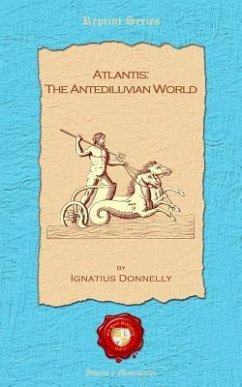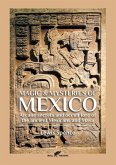Once existed in the Atlantic Ocean, a large island, which was the remnant of an Atlantic continent, and known to the ancient world as Atlantis. The description of this island given by Plato is not, as has been long supposed, fable, but veritable history. Atlantis was the region where man first rose from a state of barbarism to civilization. In the course of ages, it became a populous and mighty nation, from whose overflowings the shores of the Gulf of Mexico, the Mississippi River, the Amazon, the Pacific coast of South America, the Mediterranean, the west coast of Europe and Africa, the Baltic, the Black Sea, and the Caspian were populated by civilized nations. It was the true Antediluvian world; the Garden of Eden; the Gardens of the Hesperides; the Elysian Fields: the Gardens of Alcinous; the Mesomphalos; the Olympos; the Asgard of the traditions of the ancient nations; representing a universal memory of a great land, where early mankind dwelt for ages in peace and happiness. The gods of the ancient Greeks, Phoenicians, Hindoos (archaic spelling of Hindu), and Scandinavians were simply the kings, queens, and heroes of Atlantis; and the acts attributed to them in mythology are a confused recollection of real historical events. The oldest colony formed by the Atlanteans was probably in Egypt, whose civilization was a reproduction of that of the Atlantic island. The Phoenician alphabet, parent of all the European alphabets, was derived from an Atlantis alphabet, which was also conveyed from Atlantis to the Mayas of Central America. Atlantis was the original seat of the Aryan or Indo-European family of nations, as well as of the Semitic peoples, and possibly also of the Turanian races. Atlantis perished in a terrible convulsion of nature, in which the whole island sunk into the ocean, with nearly all its inhabitants. A few persons escaped in ships and on rafts, and carried to the nations east and west the tidings of the appalling catastrophe, which has survived to our own time in the Flood and Deluge legends of the different nations of the old and new worlds. The fact that the story of Atlantis was for thousands of years regarded as a fable proves nothing. There is an unbelief which grows out of ignorance, as well as a scepticism which is born of intelligence. The people nearest to the past are not always those who are best informed concerning the past.
Hinweis: Dieser Artikel kann nur an eine deutsche Lieferadresse ausgeliefert werden.
Hinweis: Dieser Artikel kann nur an eine deutsche Lieferadresse ausgeliefert werden.








